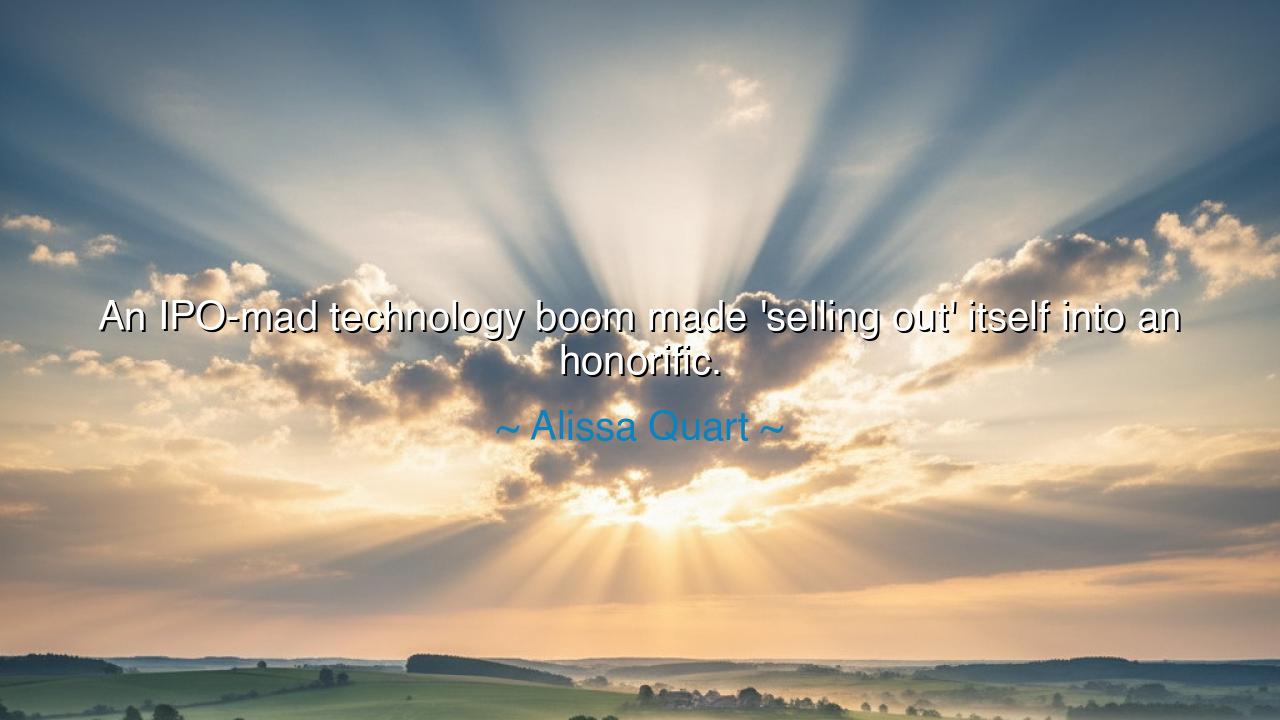
An IPO-mad technology boom made 'selling out' itself into an






Alissa Quart, in her sharp observation of our modern age, declared: “An IPO-mad technology boom made ‘selling out’ itself into an honorific.” Though her words belong to the era of digital fortunes and markets aflame with speculation, their meaning is as ancient as the tale of men who exchange their ideals for power, gold, or fleeting praise. She speaks of a time when the rise of technology, driven by the fever of Initial Public Offerings, transformed what once was a mark of shame—selling out—into a badge of glory. In this paradox lies a reflection on human nature, ambition, and the shifting values of society.
Once, to sell out meant to betray one’s art, one’s craft, or one’s integrity for wealth. The poet who altered his verses for the favor of kings, the philosopher who bent truth to flatter rulers, the artist who forsook beauty for coin—all were condemned as having sold their soul. Honor belonged to those who resisted such temptation, who remained steadfast in principle, even when hunger gnawed and obscurity loomed. Yet in the technology boom, where fortunes were forged overnight and companies leapt from obscurity to global dominance, the very act of selling out—of cashing in, of converting vision into stock and stock into gold—became celebrated as triumph.
The late 1990s and early 2000s bore witness to this transformation. Small start-ups, born in garages and spare bedrooms, ascended like comets into the heavens of Wall Street. Founders, once mocked for their eccentric dreams, were suddenly hailed as visionaries when their ventures reached the sacred rite of the IPO. The act of surrendering one’s independence to the public market, once viewed as dilution of spirit, became instead the crowning moment. Selling out no longer whispered of betrayal; it thundered of victory. Quart names this inversion, where society itself rewrote the meaning of honor to suit the fever of wealth.
Consider the tale of Netscape, whose public offering in 1995 ignited the frenzy of the dot-com age. Its shares skyrocketed on the first day, and the young men behind it became instant millionaires. In earlier times, sages might have warned that such speed in fortune is dangerous, that wisdom grows slowly while greed rises swiftly. Yet the culture of that age exalted them as heroes, and countless others rushed to imitate them, not to build for the sake of building, but to chase the rapture of the IPO. When the bubble burst, as bubbles must, many were left in ruin, but by then the myth had already been written: that to sell out was to arrive, to be crowned by the gods of commerce.
Quart’s words remind us that values are not fixed, but pliable, bending beneath the weight of cultural obsession. What one generation condemns, another may sanctify; what once marked weakness may be rebranded as strength. This is both wondrous and perilous, for it means society itself can be deceived into mistaking greed for virtue, and virtue for folly. The wise must learn to see through these masks, discerning the eternal from the passing, the true honor from the counterfeit.
The lesson here, O seekers, is not that wealth is evil, nor that selling out is always betrayal, but that one must guard the flame of purpose. If your work serves only the hunger for gold, then your triumph is hollow, for gold is a fickle master. But if your work is born of vision, integrity, and service, then whether you hold it privately or share it with the world, your honor remains intact. An IPO may come, and wealth may follow, but these should be means, not ends.
Therefore, in your own life, do not let the chorus of the crowd dictate what honor means. Ask yourself: “What is my work for? What is my dream’s true purpose?” If the answer is only coin, then beware, for you are already selling out, whether or not the world applauds you. But if the answer is creation, contribution, or the bettering of others, then even if you one day stand on the balcony of the market bell, you will not have betrayed yourself. Seek balance—between passion and profit, between honor and ambition—and you will walk the path of those who endure when the booms and bubbles of history have long since faded.






AAdministratorAdministrator
Welcome, honored guests. Please leave a comment, we will respond soon